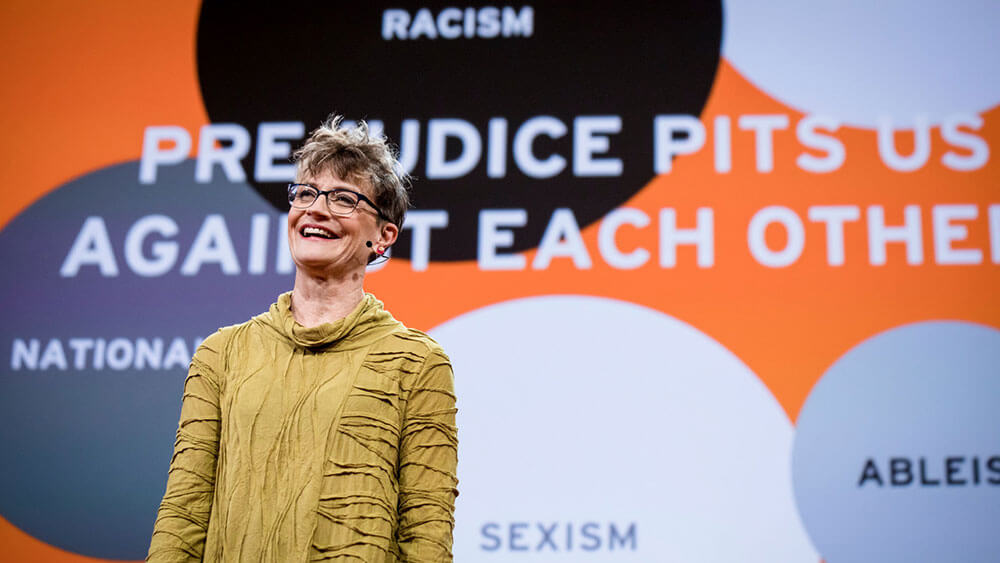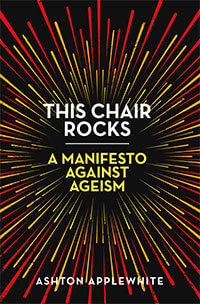
Ashton Applewhite speaks during TED2017 in Vancouver. The self-described “pro-aging radical” has circled the globe speaking out against ageism. (TED Talks)
In the 10-plus years since Ashton Applewhite, a New York City–based writer, began researching longevity and interviewing octogenarians at work, she discovered that almost all of what she had thought about aging was wrong.
Applewhite had expected, for example, that older people were more depressed compared with others — instead she found that they enjoyed even better mental health than the young or middle-aged. She had thought that a sizable percentage of Americans over the age of 65 lived in nursing homes, but the actual percentage, she writes in This Chair Rocks: A Manifesto Against Ageism, is 2.5 percent. As she collected research about topics including cognition and social connection, and interviewed artists, park rangers, and pediatricians who were working into their 80s, Applewhite, who is now 66, found herself feeling better and better about growing older, she writes.
She also began to question why there had been such a big disconnect between her own vision of what it was like to grow old and the reality she encountered. “It was ageism,” Applewhite concluded, “the relegation of older people to second-class citizenship” — or more formally defined as discrimination and stereotyping on the basis of age. “We know that diversity means including people of different races, genders, abilities, and sexual orientation,” she writes. “Why is age typically omitted?”
In recent years, Applewhite — who describes herself as a “pro-aging radical” — has circled the globe, speaking out against ageism, which she called the “least remarked-upon bias,” and its widespread negative effects on the economic, as well as mental and physical, well-being of everyone, not just older people. She is on a crusade, she writes, to “overturn American culture’s dumb and destructive obsession with youth, and challenge the way people at both ends of the age spectrum are devalued and disrespected.”
In her “Let’s End Ageism” talk at TED2017 in Vancouver, which she delivered to a standing ovation, Applewhite asked, “We know it’s not okay to allocate resources by race or sex. Why should it be okay to weigh the needs of the young against the old?”
In that talk — which has nearly 1.5 million views at the time of this writing — she said, “All prejudice relies on ‘othering’ — seeing a group of people as other than ourselves: other race, other religion, other nationality. The strange thing about ageism: That other is us.”
 In an interview with Convene, Applewhite elaborated on bias based on age. “No prejudice makes sense,” she said. “They’re all irrational and they’re all wrong, but it’s especially ill-informed to say old people are ‘X.’ The older you are, the less that your age says about what you’re capable of physically, socially, and professionally.”
In an interview with Convene, Applewhite elaborated on bias based on age. “No prejudice makes sense,” she said. “They’re all irrational and they’re all wrong, but it’s especially ill-informed to say old people are ‘X.’ The older you are, the less that your age says about what you’re capable of physically, socially, and professionally.”
“It is time to ditch the ‘young-old’ binary,” Applewhite said in her TED talk. “There is no line in the sand between old and young, after which it’s all downhill. And the longer we wait to challenge that idea, the more damage it does to ourselves and our place in the world, like in the workforce, where age discrimination is rampant.”
Ageism also cuts the other way, placing a burden on young adults when it strips away the ability of older people to contribute economically, Applewhite writes in her book. “The mutually advantageous alternative is to see age as an asset.”
“Experience is not a liability,” she told Convene. “It’s nutty to even have to say that out loud.” More from our interview:
How has the conversation around ageism changed over the last decade? Are you seeing more research about it?
I’m seeing tons more. I have a Google alert set to ageism, and there’s more stuff on it all the time. The word is simply cropping up more, says the great algorithm in the sky.
My own trajectory serves as a litmus test. I just crisscrossed the country on a book tour [for This Chair Rocks, published by Celadon Books in March]. Four years ago, when I first tried to sell the book, I could not get a mainstream publishing company to pay the subject the kind of attention I thought it deserved, so I self-published it. And it’s the same book. So I think that’s an indicator.
Related: Ending the ‘Last Acceptable Prejudice’
Ten years ago, I was busy telling people what ageism is and why it matters. Now people are coming to me, or people talk to me on the tour, which is, granted, a self-selecting sample. But they are asking, “How can I be anti-ageist in what I do? How can I incorporate what I have learned about ageism in the company I am starting, the diversity program I am heading up?”
I got a fantastic letter from a medical-school student in London two days ago saying, “How can you talk about person-centered care in gerontology and not even talk about ageism? Not talk about the prejudice and discrimination in which older people are subjected?” It’s a really good question.
What are the truths and untruths about older people in the workplace?
Let me put it this way, not a single negative stereotype about older workers holds up under scrutiny. It might take an older worker longer to learn something — although this is not the case if it attaches to something we already learned earlier in life. We might be less fast, but we make fewer mistakes. If we hurt ourselves, it’ll take us longer to heal, but we hurt ourselves less often.
The point is not that older workers are better than younger workers, it’s that a mixed-age workforce is better, just like a mixed-race workforce, a mixed-gender workforce. We come to better decisions — we know that the business case is huge. We know that diverse companies work better. We know that they are more profitable. And age is a criterion for diversity.
Do you think discrimination based on age is becoming more of a problem or less of a problem?
Well, it’s more of a problem as more people get older and are forced out of the workplace — over half of American workers over 50 are forced out of jobs. And at 50, you have 20, 30, or even 40 more years on the planet.
If older people are forced out of the workforce, who is going to support us? Not everyone’s going to want to step over our starving bodies. And it makes no sense. In my book, I debunk this idea that older people are a drag on the economy. The more older people that are employed, the more money we’d have to spend to benefit the economy, and the more jobs we create for younger people. It’s win/win. It is a fallacy that older people take jobs away from younger people. What’s good for older workers, broadly speaking, is good for younger workers.
You also address generalizations about the capacities of older people.
Aging is incredibly heterogeneous. It’s a defining characteristic of old age. As we age we get more different from one another. In a group of new- borns, each one is unique, of course. But a group of 17-year-olds have an awful lot more in common physically, socially, and cognitively than a group of 37-year-olds, who are way more homogeneous than a group of 67-year-olds.
Geriatricians say — and I’ve heard one say it — if you’ve seen one 80-year-old, you’ve seen one 80-year-old. If you see a five-year-old, you have a pretty good chance of guessing at their basic cognitive and physical capacity. Not so with old people.
Any judgment about people on the basis of age is ageist and most of it, I mean it’s all bias, how could any statement be true about an entire age cohort? In the broadest sense all this does is perpetuate existing power structures, which take advantage of us and exploit us.
I just saw an article about ageism in tech in China kicking in at age 30. This is not a story about how 31-year-olds [are suddenly less capable], this is a story about how people, before they hit 30, which, as I understand it means, they start families and they start to have some inkling of their value and priorities, are less exploitable than even younger workers who can be persuaded to work insane hours for really sh*tty pay. That is how capitalism uses ageism to pit workers against each other to benefit the people at the top of the food chain.
You talk in your book about how society looks at older people, and how much of that we absorb, can actually affect how we physically age.
A case I have been making forever is for an anti-ageism campaign as a public health initiative, because of the growing mountain of medical evidence that shows that attitudes towards aging affect how our minds and bodies function at the cellular level.
The fact is we are all brainwashed into an overly negative opinion. People with a more positive attitude toward aging are less likely to get Alzheimer’s, even if they have the gene that predisposes them to the disease.
And the thinking goes that their positive attitudes buffer them against the stress of anxiety and prejudice and guess where those come from? Age- ism — and living in a world that bombards you with the message that because you are over a certain age, you’re useless, ugly, incapacitated, and should just shuffle away out of sight. Sorry, but you’re getting me a little fired up.
Sometimes I say I am in the “both-sides-of-the-story” business. We only hear the negative [about aging] because, honestly, for one thing, no one’s going to click on a news story that says: “Most people chugging along just fine,” which is the truth. … Alarmism sells, fear sells, shame sells. If we see aging as a problem we can be persuaded to buy stuff to “fix” it, or “stop” it, or “cure” it.
I’m talking about deep, deep upheaval to the way things work. And I’m also talking about you having to look at your own internalized menace. I mean the first step is to look at your own attitude towards age and aging — we can’t challenge bias unless we’re aware of it.
Barbara Palmer is deputy editor of Convene.
Test Time
- Earn one clock hour of certification credit.
- Once you’ve finished reading the June Convene age discrimination stories, read an Experient blog post, “Why the Over-50 Crowd Still Matters for Events,” by Donna Kastner.
- To earn certification clock hours, visit Convene’s CMP Series page to answer questions about information contained in this CMP Series article and the additional material.
The Certified Meeting Professional (CMP) is a registered trademark of the Events Industry Council.
